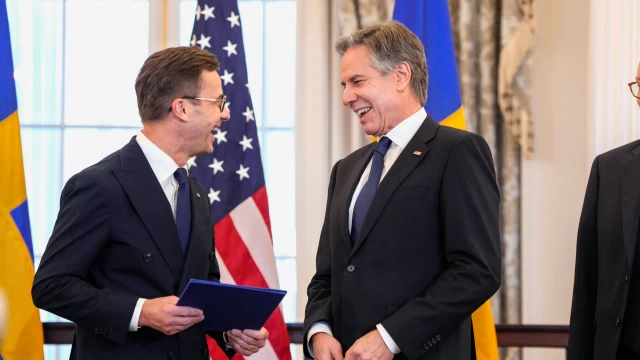Following Russia's invasion of Ukraine, Sweden ends its post-World War II neutrality, joining NATO after two years
- Posted on March 8, 2024
- International Affairs
- By Arijit Dutta
- 527 Views
Sweden officially joins NATO in Washington, marking a significant shift in its post-World War II neutrality stance, prompted by Russia's invasion of Ukraine. The move reflects Sweden's strategic reevaluation, emphasizing collective defense and aligning with Baltic security dynamics amid growing tensions with Russia.
 Image Source -www.wspa.com
Image Source -www.wspa.com
Sweden
made a historic decision to join NATO in Washington on Thursday, marking a
significant departure from its longstanding post-World
War II neutrality stance. The decision comes two years after Russia's
invasion of Ukraine, which prompted Sweden to reconsider its national security
policy. Swedish Prime Minister Ulf Kristersson handed over the final
documentation to the US government, culminating in a lengthy process to secure
the backing of all NATO members for Sweden's accession.
U.S.
Secretary of State Antony Blinken received Sweden's accession documents from
Prime Minister Kristersson, emphasizing the transformative impact of Russia's
invasion of Ukraine on Swedish public opinion. Blinken noted a profound shift
in attitudes towards NATO, driven by the realization that Russia's aggressive
actions posed a significant threat to regional stability.
Sweden's accession to NATO holds strategic significance for the alliance, particularly given its 1,340 km border with Russia. The move underscores Sweden's commitment to collective defense and enhances NATO's deterrence capabilities in the Baltic region. Prime Minister Kristersson hailed the moment as historic, emphasizing Sweden's readiness to defend freedom alongside its NATO allies.
Also Read: Plant Power Day 2024: Advocating For Health, Animals, And Planet
Membership
in NATO offers Sweden access to the alliance's common defense guarantee,
providing assurance that an attack on one member will be met with a collective
response. The decision to join NATO reflects Sweden's recognition of the
evolving security landscape and the need for closer cooperation with
like-minded nations.
While
Sweden's neutrality stance dates back over 200 years, the decision to join NATO
represents a clear break from the past. Despite Sweden's previous reluctance,
the growing tensions with Russia and changing geopolitical dynamics
necessitated a strategic reevaluation.
In
conclusion, Sweden's accession to NATO marks a significant milestone in
European security architecture, reshaping the region's defense dynamics and
signaling a commitment to collective security in the face of emerging threats.




